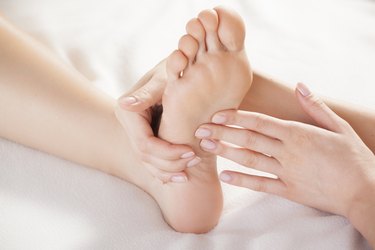
Vitamin B3 is essential for healthy skin, and a deficiency in this vitamin B3 can result in a condition known as pellagra. One of the most common symptoms of pellagra is cracked and scaly skin, which can appear all over your body, including on your heels. If you suspect you have this condition or are concerned about your B3 intake, see your doctor to discuss dietary changes and solutions for your skin problems.
Importance and Function of B3
Video of the Day
Vitamin B3, or niacin, plays an important role in the health and texture of your skin, and it is also essential for your hair, eyes and liver. Niacin contributes to the functions of your nervous system, and it can help your blood circulate more efficiently as well as lower high cholesterol levels. The recommended dietary allowance, or RDA, for B3 is 16 milligrams for adult men and 14 milligrams for adult women, according to both MedlinePlus and the University of Maryland Medical Center. You can get this by eating foods like beets, brewer's yeast, salmon and peanuts. Or you might talk to your doctor about a supplement.
Video of the Day
B3 Deficiency and Pellagra
A vitamin B3 deficiency is rare in the United States, and it is most often the result of high alcohol intake. Symptoms of a mild deficiency include indigestion, fatigue, vomiting, canker sores and depression. If your deficiency becomes severe, you may develop pellagra, and the symptoms of this condition include cracked and scaling skin, as well as diarrhea and dementia or other types of mental impairment such as confusion or delusions. The treatment is typically consuming a balanced, nutrient-rich diet, as well as niacin supplements, according to the University of Maryland Medical Center.
Other Causes of Cracked Heels and Remedies
You might develop cracked heels without having a B3 deficiency. Dry skin, atopic dermatitis, psoriasis, calluses, being overweight or standing for long periods of time can all cause your heels to become dry and cracked. Applying a moisturizing lotion two to three times a day can help treat and prevent this from occurring. Look for a product with ingredients like urea or alpha-hydroxy acids, which will both get rid of scaling and help keep the moisture locked in your skin. Ask your doctor before trying any new products or if you are concerned about your cracked heels.
Additional Considerations
Always see your physician before you begin taking new supplements, using new products or altering your diet. Tell her if you suspect a niacin deficiency, and let her know about any symptoms you experience, as well as any medications you are on or other conditions you have. For example, if you have liver disease, stomach ulcers or gout, you should not take niacin supplements. This vitamin can also interact with medications like antibiotics and those used to treat high blood pressure.